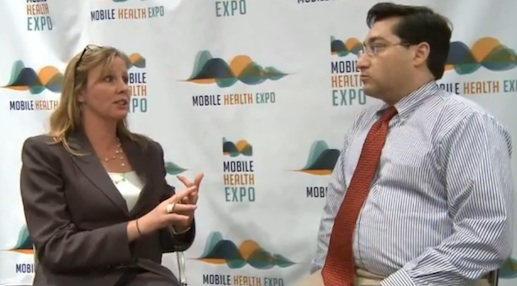
Click to watch the video of MobiHealthNews Contributing Editor Neil Versel interviewing Wendy Thomas
Last week, we reported that the organizers of the Mobile Health Expo, one of many fledgling conferences focused on m-Health, was going to start up a not-for-profit trade organization called the Mobile Health Association.
Depending on how you look at it, the new entity is either providing much-needed leadership, or joining an already crowded arena that includes advocacy groups such as the American Telemedicine Association, the mHealth Initiative, the mHealth Alliance, the Wireless-Life Sciences Alliance, the Continua Health Alliance, the West Wireless Health Institute and, to a lesser extent, CTIA – The Wireless Association and the GSM Association. Mobile Health Expo (and Mobile Health Association founder) Wendy Thomas prefers the former characterization.
"The idea is that there is a need for an association that is an umbrella organization over all the special-interest groups and associations that actually make up the mobile health ecosystem," Thomas said at the conclusion of last week's second Mobile Health Expo in New York. Plenty of groups represent wireless healthcare, telecommunications, telehealth and mobile money, which is an up-and-coming segment that Thomas believes will be important in healthcare, she said.
"There are many different special-interest groups, and even though there are associations that have some similarities, they are also very specific to their own special-interest areas." Thomas envisions the role of the new association as analogous to a photographer's association, with subgroups for wedding, sports and press photographers. "There is some overlap and some shared interest and some specific interest, and that's what we're doing, putting the umbrella organization over all the others," Thomas said.
The nascent organization still does not know what direction it will go, but is soliciting interest from individuals, companies and associations. "We put out a call for interest here at the Mobile Health Expo," Thomas said at the conference. "We've already received enough interest that we know it's worthwhile to move forward with it."
The next step is to review the input from founding members—Thomas hasn't revealed their names yet—create a board, and hire an executive director. There also is the matter of filing the paperwork to make it all official.
"We have a couple of options. I know that it will be a not-for-profit for sure. The idea is that it will be made to educate [about mobile health] and then also to pool resources in order to influence policy," Thomas said.
A number of veteran lobbyists and public-policy attorneys in Washington, D.C. and Thomas' home state of Texas have been involved with the conference. One notable figure who spoke at both last week's conference and the first Mobile Health Expo last fall is Frederick McClure, a legislative assistant to Presidents George H.W. Bush and Ronald Reagan.
"We actually consulted with several of them about the formation and which direction do we need to go to use it to make sure that we form the proper not-for-profit that actually can do those types of things," Thomas said.
Thomas envisions an international organization that will expand outside the U.S. in 2012. This happens to coincide with plans to put on the Mobile Health Expo in Europe, Asia and the Middle East next year.
The strategy is for board membership to rotate so it does not become too heavily weighted toward any particular industry segment. "I think it's going to be very organic because it's so broad," Thomas said. After all, mobile health is a segment of both the healthcare and mobile industries that has grown from the grass roots.
"We work very closely with a lot of entrepreneurial companies. That's what we see at our expo. It's mostly entrepreneurs that are out there and are trying to build a new service or a new model," Thomas said. Even large companies that are playing in m-health are viewing this area from an entrepreneurial perspective, according to Thomas.
"They're hiring the people, just like we would be doing with the association, that have the skill sets to go in and put this new model and new services in place. I think that it's in the infancy [stage] and you have to hire the right people that can build it first," she said.


















